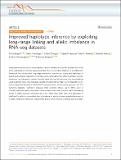Improved haplotype inference by exploiting long-range linking and allelic imbalance in RNA-seq datasets
Author(s)
Berger, Emily; Yorukoglu, Deniz; Zhang, Lillian; Nyquist, Sarah Kate; Shalek, Alexander K; Kellis, Manolis; Numanagic, Ibrahim; Berger Leighton, Bonnie; ... Show more Show less
DownloadPublished version (870.6Kb)
Publisher with Creative Commons License
Publisher with Creative Commons License
Creative Commons Attribution
Terms of use
Metadata
Show full item recordAbstract
© 2020, The Author(s). Haplotype reconstruction of distant genetic variants remains an unsolved problem due to the short-read length of common sequencing data. Here, we introduce HapTree-X, a probabilistic framework that utilizes latent long-range information to reconstruct unspecified haplotypes in diploid and polyploid organisms. It introduces the observation that differential allele-specific expression can link genetic variants from the same physical chromosome, thus even enabling using reads that cover only individual variants. We demonstrate HapTree-X’s feasibility on in-house sequenced Genome in a Bottle RNA-seq and various whole exome, genome, and 10X Genomics datasets. HapTree-X produces more complete phases (up to 25%), even in clinically important genes, and phases more variants than other methods while maintaining similar or higher accuracy and being up to 10× faster than other tools. The advantage of HapTree-X’s ability to use multiple lines of evidence, as well as to phase polyploid genomes in a single integrative framework, substantially grows as the amount of diverse data increases.
Date issued
2020Department
Massachusetts Institute of Technology. Computer Science and Artificial Intelligence Laboratory; Massachusetts Institute of Technology. Department of Mathematics; Massachusetts Institute of Technology. Department of Chemistry; Massachusetts Institute of Technology. Department of Electrical Engineering and Computer ScienceJournal
Nature Communications
Publisher
Springer Science and Business Media LLC